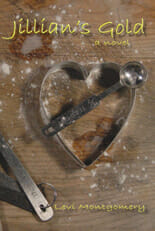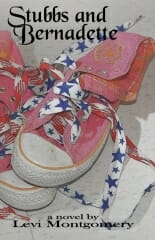by Levi Montgomery
I’ve got a great article for you today by a self-published author with 12 books in print. I met Levi when he sent me Jillian’s Gold to review for my self-published book design reviews at Self Publishing Review. When Levi left a comment on a blog post about “how depressing flat-lined sales can be.” I asked him to tell his story, and I’m glad I did. Here it is.
It began with a story that wouldn’t go away.
I began to write in my childhood, and I kept it up all through grade school, junior high, and high school. Various things got in the way then, and I laid that pastime aside (“I’m a loser,” the Beatles are assuring me as I write this, courtesy of my MP3 player. “I’m a loser, and I’m not what I appear to be.” Nice touch, universe.). There was one story that wouldn’t go away, though. It pestered me for years, for decades. I watched the movie Same Time Next Year and the story turned over in its slumber. The smell of pencil shavings made it twitch. Like a grey seal under the ice, its heartbeat was down to a slow slow throb, but it was not dead.
Truth be told, the thing that had most put me off writing was the typewriter and the linearity it enforced. Various scenes from the sleeping story were fleshed out, live, flitting in the corners of my mind, but to sit down and bang the whole thing out, to type Once upon a time and continue through until The End, that was just some form of mental waterboarding, was all that was. Then came computers. I knew then that I could do it when the time came. I could write what I had, skip over what I didn’t have, loop through the story over and over until it had told all of itself. I could do it.
Finally, in March of 2007, sparked by the billionth hearing of a line by Bryan Adams, I sat down and began to write. “Standing on your mama’s porch,” Adams sang to some girl, perhaps imaginary and perhaps not, “you told me that you’d wait forever.” And I thought Well, what if she really did wait forever?
The sleeping story became my first novella, The Back Porch, and I began a novel while I studied the querying process. But the more I learned about agents and queries, the more disgusted I became. Silly me, I’d thought the process would consist of getting an agent to read the story. To decide whether or not to represent the story based upon its own quality, not whether or not to represent the author based upon his ability to write a query. Which is not, I might point out, the story. Don’t get me started on the complete failure of the query process. Instead, let’s go over here and look at something I was told a dozen times while I searched for an agent (not, of course, by any of the agents):
“You can always self-publish,” people kept telling me.
But I knew self-publishing. My mother self-published a book of poetry a million years ago. I knew what self-publishing meant. It meant macaroni and cheese six nights a week while you save up money to buy a stack of books to molder away in your garage, that’s what it meant. But I also knew something else, something whose voice grew stronger and stronger as the queries went unanswered.
I have made and sold a stack of model railroading structures, bridges, and rolling stock that would sink a battleship. I have no railroad, I don’t want a railroad, and in fact, I can’t think of anything more boring than sitting around playing trains. These guys have “scale time” clocks. I kid you not. They spend a two- or three- or four-hour session duplicating the operations of a full-sized railroad. I don’t want that. I just want to make the buildings. And twenty years ago, once I had sold a building to each of the score or so of model railroaders I could have reached in ye olden dayes, I would have been done. But then came eBay, and now I have buildings in Australia and England and the Philippines. I have dozens across North America.
Surely, I thought, surely I could sell books the same way. Of course, what I learned was that modern self-publishing is not at all what it used to be, that there was no stack of books, that the orders were fulfilled without my participation and there would be no need for sales on eBay, and with that, I was hooked. In four years, I’ve written and published five novels and one book of four novellas in print, and I have published those same four novellas plus two more as ebooks. I have three more novels finished, one of which, Lightning of Her Own, is coming out as an ebook only this very week, and one of which, Blood Bonds, is coming out in print and ebook within the next few weeks.
What you’ve all been waiting for: numbers.
Because, you know: life is all about numbers. Especially the self-publishing life. Joe Konrath. Amanda Hocking. Zoe Winters. Fame and fortune and adulation and enough money coming in every month to stave off the guilt of having my wife work while I loll about the house all day eating bon-bons and writing my little books, right? Right?
Wrong. Numbers? I’ll give you numbers: I published my first book in January of 2009. Twenty-six months ago, discounting rounding errors. In my best week ever (not long ago), I sold six ebooks and two print books. Six ebooks and two print books. My best week ever.
Never mind Zoe and Joe and Amanda. And let me get something straight right now: I’m not bitter toward any of them, or toward anyone else who has achieved better sales than I have. I wish them all the best in their careers, and may they beat down the weeds and make the path straight, because I’m back here somewhere, trailing along behind them. The more authors there are who are in control of their own paths, the more sales they make, the better things will be for all the rest of us. A rising tide floats all boats.
But never mind them. The ones who get to me are the ones who release a new book, and then they blog about the results, and they whine that they only sold 300 copies on their first day, and that they were really hoping for more “success.”
Well, there’s more than one way to define “success.”
In my darker moments I wonder out loud if perhaps I’m just not as good a writer as I thought I was, but my wife will have none of it. “Every review you’ve ever gotten,” she is fond of pointing out, “has been a positive review. Every email you’ve gotten from a reader has been a positive one. Zoe Winters said The Death of Patsy McCoy is the most amazing thing she’s ever read.”
That’s how I define a kind of success. Artistic success. That came when my closest friend, a big hulking giant of a man, a commercial fisherman all his life, an Alaska-outdoors-in-the-winter kind of a man, told me he cried over The Back Porch. “Not a teary, wet-eyed kind of a cry, but a sobbing, gasping, break-down kind of a cry.” Artistic success came when a total stranger emailed me to tell me that Stubbs and Bernadette had inspired her to take the steps she needed to take.
And that’s all fine and good, but self-publishing, as has been said so many times by so many people, is not just art. It’s not just writing. It’s writing and editing and cover design and page layout and, above all else, marketing. I’m a pretty decent writer. With all due modesty and no extra, I can say that. But I really stink at marketing.
Some of the reasons why an excellent story may not sell well:
- Cover design.
I freely admit, in the beginning, I had no idea what cover design might do to a book, or why and how it might be important. My first cover was truly awful (no, don’t bother going to look for it—it’s been replaced. And I still don’t much like it.) As time went on, I got more and better tools, I got further up the learning curve, and my covers have gotten better, but even now, the best covers I have are the ones I’ve paid for. Eventually, all of my earlier titles will be replaced with new editions, but in the meantime, the absolute worst have been dealt with.
- Cover copy, description, etc.
This is probably my weakest point, and I know why, but there’s not much I can do about it. The fact of the matter is that I never read the back cover of a book until I’ve read the book. I’ve been burned too many times, when some over-eager copywriter put something on the back of the book that simply should not have been there. I’ve had murder mysteries ruined. I’ve seen the entire structure of the first third of a novel laid open like an autopsy on the back cover. I’m a chapter one, page one, word one person. Begin reading. Read until you’re done, or until you don’t care what happens on the next page. So I struggle every time with what to put in a description, or on the back cover, that will entice readers without giving things away, and I know my sales suffer for that.
- I don’t write about vampires.
Or zombies or werewolves or fallen angels. I have no problem with those who do, but that’s not what I have, and I can only write the stories I have. To a certain degree, crass though it may seem to say it, sales don’t depend on whether you get read, they only depend on whether you get purchased. And people today are buying vampire stories simply because they’re vampire stories. Don’t chase that market, or any other. Write what you have. But be aware it will be reflected in your sales numbers.
- Marketing.
I had someone tell me, a long time ago, that marketing was all about ego, that all you needed was a big mouth and the willingness to use it. I don’t know if that’s true or not (I suspect it isn’t), but since the person who told me that a) was in marketing, b) had a big mouth, and c) had an ego to match, he may have been on to something, and it’s certainly true that the top leaders in the indie sales world are always out there. Again, I mean no disrespect to them, but that’s another thing I don’t have. I’m just not that pushy. I’d rather you read someone else’s vampire story and truly love it than have you read The Bumbler’s Apprentice and not love it.
- Price.
I watch the debate about price with some serious concerns. On the one side, there is the undeniable fact that if everyone else goes to 99-cent ebooks, then readers aren’t going to buy more expensive books as readily. But then there’s that whole “Fiction is information, and information should be free” thing. Fiction is art. I can’t eat my stories. They make a poor roof. The fact of the matter is that I give up my hunting and gathering time in order to sit and make up stories to regale you with around the fire, and if you want me to keep it up, then you have to give me some of what you hunted and gathered. If you can’t do that, then I’m going to have to go back to doing my own hunting and gathering, and then who will tell you stories?
As an experiment, I have reduced the price on all of my novellas to 99 cents for the month of March. I thought there was a spike in sales the first day after I did that, but they’re back to their old flatline now, and truth be told, the sales are so miniscule that a good day looks a lot like a spike, so who knows? The prices will go back up, I know that, because it just feels cheap to sell so much work for so little.
- Series/trilogies etc vs standalone novels.
The jury hasn’t really decided this one yet, but there seems to be some evidence that the readers want series. I personally don’t really want to write a series. I do have a book in progress which, while not really a sequel, does tell the story, four years later, of a girl who was a strong supporting actress in Jillian’s Gold. (Yes, Avery, if you’re reading this—Zillie gets her own book. Now stop throwing things at me!) But I’ve resisted the pressure to do a series—until now. I have a novel coming out this week, Lightning of Her Own, that will be the first in a trilogy. We’ll see how that goes, I guess.
- Advertising.
Everywhere I go, indie authors and those who support them are saying that advertising doesn’t really work, and they may be right. But I’ve been running some ads through a very low-cost program I found, and although, as I said, the sales are so low that it’s nearly impossible to see any results of any sort from anything, I do know that the ads have been driving traffic to my site. At least then, they’re looking at my books. Now it’s up to me to try to write something that will entice them.
Conclusion? What if I don’t have one?
People read what they read. I write what I write. When the intersection of those circles grows large enough that my wife can quit her job, I will have succeeded beyond my wildest dreams.
Out of respect to Joel, I’ve not linked any of those titles and things back to my site, but you know where to find me! My site is at www.levimontgomery.com, my books are available on Amazon, on Barnes & Noble, and a zillion other places that sell books online, and you can always reach me on Twitter as @LeviMontgomery.
Photo by zerok. Amazon links are affiliate links.





